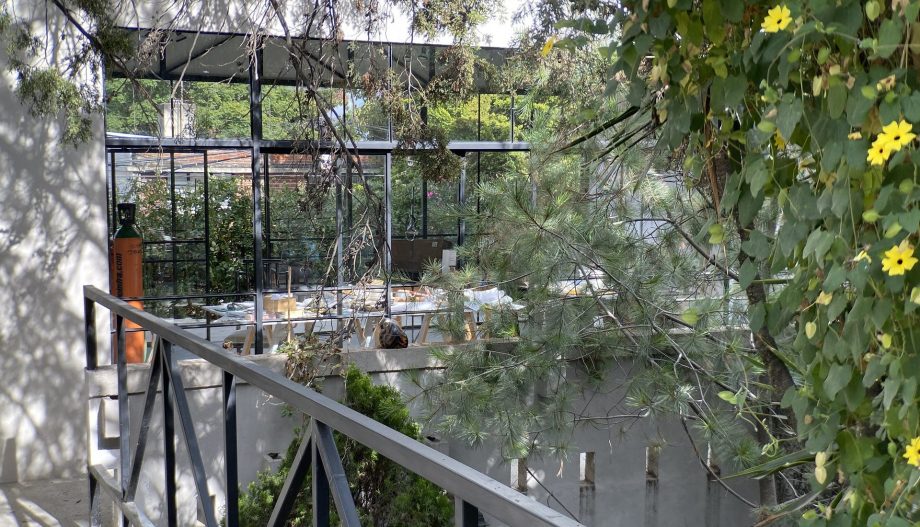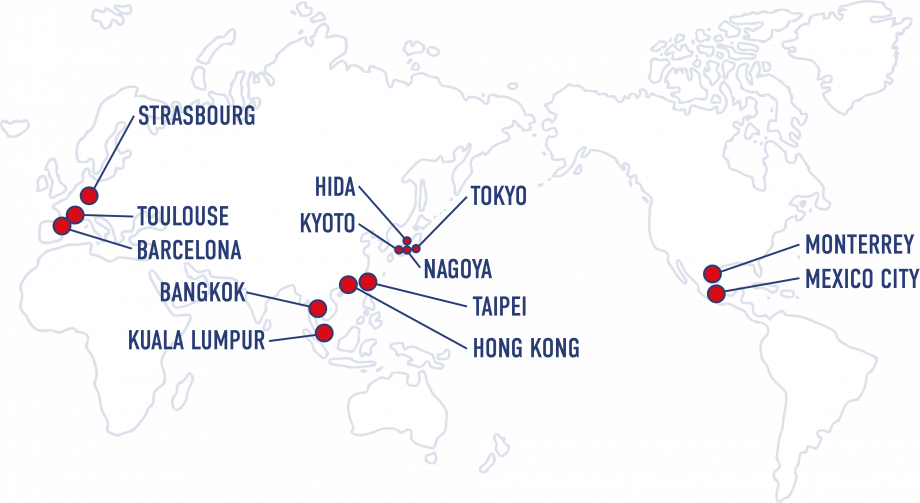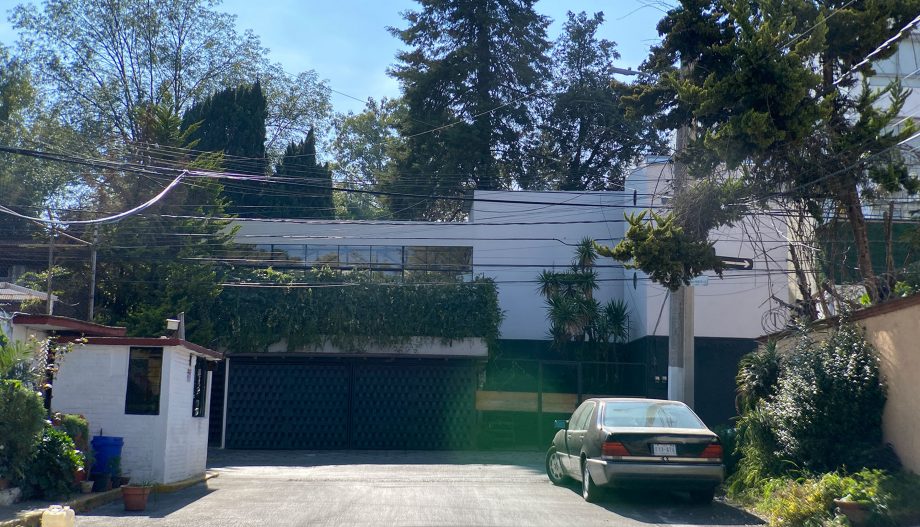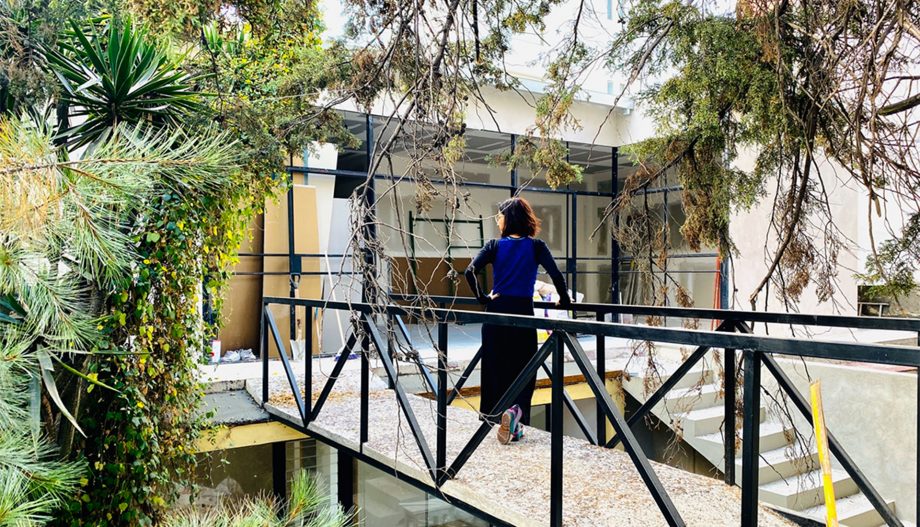News & Releases
February 15, 2022
FabCafe Global Editorial Team
In February 2022, FabCafe Mexico City opened as the 13th new FabCafe location in the world.
FabCafe Mexico City, the second FabCafe location in Mexico, is located inside the Membrana Lab, which experiments and spreads biotechnology, XR, and other technologies. FabCafe Mexico City and Membrana Lab is run by curator and artist Tania Aedo and biomedia artist and glass artisan Federico Hemmer.
The first FabCafe opened in Shibuya, Tokyo in 2012. In the 10 years since then, the FabCafe global network has expanded to 13 locations in 8 countries around the world.

Federico Hemmer (left) and Tania Aedo (right), Co-founder of FabCafe Mexico City.
The Membrana Lab, where FabCafe Mexico City is based, is a lab where XR and biotechnology experiments are conducted. Membrana means “membrane” in Spanish. Nestled between old natives trees and a charming garden, Membrana Lab has a space for XR, wet and dry bio labs, and an exhibition space.

The Membrana Lab collaborates with artists and researchers in art, science, technology, narrative exploration and other disciplines. The process and prototypes of their activities are exhibited in the exhibition space. In the future, long-term activities such as artist residencies are also being planned.
The mission of FabCafe Mexico City is to spread a curious attitude and way of learning through various creativity-driven activities while connecting the local and cultural context with the contemporary global context,” said founders, Tania and Federico, who are both artists themselves.

Interview with Tania and Federico, Founders of FabCafe Mexico City
Mexico City, the capital of Mexico, is a metropolitan city with approximately 9.21 million residents. From the historic downtown area to the sophisticated cafes lining the streets, the city has a charm that cannot be described in a single word. While the city was one of the first to install shared bicycles and is actively adopting technology and new approaches, there is also a deep-rooted culture of shopping in local chaotic markets and eating tacos on the streets. As an economic and cultural hub, the city features both the cosmopolitan vibe of a modern 21st century city while embracing its rich Aztec historical and cultural roots.
Membrana Lab, where FabCafe Mexico City is located, is in the San Jeronimo district in the Lomas Quebrada area in the southern part of Mexico City. Although it is approximately 40 minutes from downtown Mexico City, the location is nearby large universities and schools such as UNAM (National Autonomous University of Mexico).
The area is also rich in nature, and is adjacent to a national park, a protected natural area, and a river that connects to the Magdalena River, one of the two rivers in Mexico City.
-
Tania Aedo
FabCafe Mexico City Co-founder
Cultural producer with a long trajectory on the participation in projects at the intersections of knowledge, especially art, science and technology. Co-founder at Membrana Lab Mexico City. Coordinator at Cátedra Max Aub, Transdisciplina en Arte y Tecnología, UNAM, Mexico and former director of Laboratorio Arte Alameda and Centro Multimedia at the National Center for the Arts in México City.
Cultural producer with a long trajectory on the participation in projects at the intersections of knowledge, especially art, science and technology. Co-founder at Membrana Lab Mexico City. Coordinator at Cátedra Max Aub, Transdisciplina en Arte y Tecnología, UNAM, Mexico and former director of Laboratorio Arte Alameda and Centro Multimedia at the National Center for the Arts in México City.
-
Federico Hemmer
Bio-Media artist, FabCafe Mexico City Co-founder
Mexico City, (1991).
Bio-Media artist, glass blower and co-founder of Membrana Lab – FabCafe Mexico City.
Hemmer’s inquiry oscillates through the intersections of art, matter, and live science. He concentrates in exploring relations between the blurry traverse betwixt objects and organisms to generate narratives such as the role of the narrator inside the lab, co-presence between dust ecology and scientific discourse, and fictions aroused by abandoned scientific facilities.
His work has been shown in art and science centers such as SymbioticA (Perth Australia), UFSM (Brazil), and Cultivamos Cultura (Portugal).
Mexico City, (1991).
Bio-Media artist, glass blower and co-founder of Membrana Lab – FabCafe Mexico City.
Hemmer’s inquiry oscillates through the intersections of art, matter, and live science. He concentrates in exploring relations between the blurry traverse betwixt objects and organisms to generate narratives such as the role of the narrator inside the lab, co-presence between dust ecology and scientific discourse, and fictions aroused by abandoned scientific facilities.
His work has been shown in art and science centers such as SymbioticA (Perth Australia), UFSM (Brazil), and Cultivamos Cultura (Portugal).
-
Business Hours: In response to the coronavirus, drinks and food are only available during events. Prior notice is required for non-event times.
Location:Guillermo Prieto No.14, Lomas Quebradas, La Magdalena Contreras, 10000 Ciudad de México, CDMX, Mexico
Webside: https://fabcafe.com/es/mexico-city/
Facebook: https://www.facebook.com/FabCafeCDMX
Instagram: https://www.instagram.com/fabcafemexicocity/
 2/17 、An event to learn more about FabCafe Mexico City and their approach to bioart!
2/17 、An event to learn more about FabCafe Mexico City and their approach to bioart!
What is the purpose of BioArt in a VUCA world?。
In today’s uncertain world, it is said to be important to build a new sense of ethics and update the way we perceive the world. Bioart is attracting attention as one of the approaches. What can it teach us to survive in our VUCA world? This event will feature Tania Aedo and Federico Hemmer of Membrana Lab, who are developing experiments in mixed reality from the perspective of biotechnology and XR, and who are opening the new FabCafe Mexico City, as well as bioelectronic artist Ana Laura Cantera, and BioClub co-founder Georg Tremmel.
-
FabCafe Global Editorial Team
This articles is edited by FabCafe Global.
Please feel free to share your thoughts and opinions on this article with us.
→ Contact usThis articles is edited by FabCafe Global.
Please feel free to share your thoughts and opinions on this article with us.
→ Contact us




